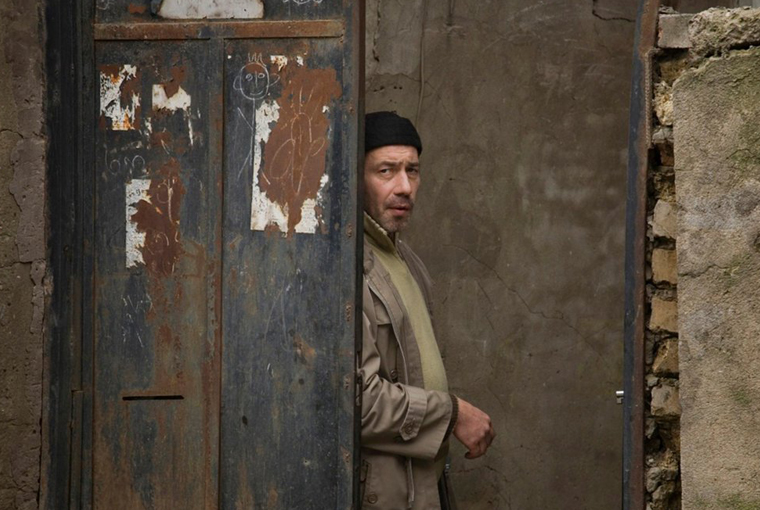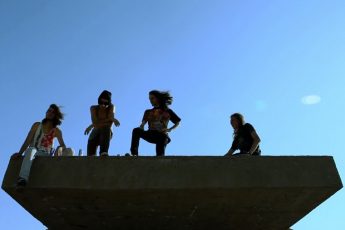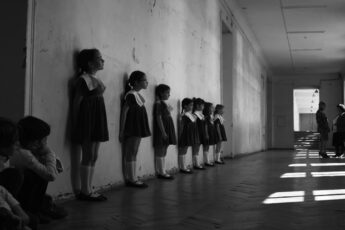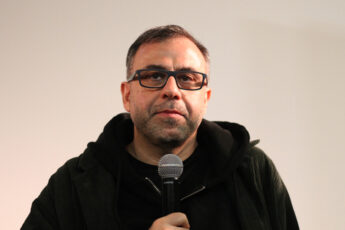Rabbit and Wolf Jump High
Levan Koguashvili’s Street Days (Quchebis dgeebi, 2010)
Vol. 56 (August 2015) by Anna Batori
Levan Koguashvili’s depiction of post-Soviet Georgia in Street Days is kept as dark as possible: ruled by corrupt politicians and policemen, the streets of Tbilisi are brimming with heroin addicts whose only solution for escaping capitalist exploitation is to zero in on their high and then chase for their next daily dose. Still, there is a genuine way out of this miserable, wretched present, Koguashvili suggests. Despite economic-existential hardship one can counter the immoral, unscrupulous reality of modern Georgia through one’s inner self if only one manages to preserve a spark of humanity.
The story of Street Days revolves around Checkie (Guga Kotetishvili), a formerly well-respected member of the community who’s now a middle-aged father and drug addict who spends his days loitering the neglected, ruinous streets of Tbilisi while getting high with his buddies. Despite his addiction, Checkie cares about his friends and family and tries to put money aside to pay back a loan and fund his son’s tuition. However, getting money in Tbilisi is not so easy, and when the son of one of his old classmates wants to buy heroin from him, Checkie has no other option but to consider the bargain. He thus finds himself at a crossroads where he must choose between saving sixteen-year-old Ika (Irakli Ramishvili), his friend’s son, and solving his financial worries. This moral dilemma is further exacerbated when the police force Checkie to snitch on Ika or else face a prison sentence.
Checkie thus embarks on a moral journey whereby he must find the least unethical way to escape the pressure of the police and, in the person of Ika, symbolically save the next generation from the decay that drugs have caused him and his peers. In order to do so, he must exercise great self-discipline and fend off his environment’s expectations (his buddies want him to get drugs, his wife expects him to pay for their kid’s education and avoid bankruptcy, and the police forces him to betray his old friend). Interestingly, Checkie gets more sober the greater the pressure mounts, slowly realizing that the only way to get out of his predicament in the corrupt network of police-drugs-politics-relations is by renouncing himself and ultimately committing suicide. A crucial point is that, by abolishing the person he has become, Checkie wins back his old self: the helpless beggar turns into a person with dignity, a man who genuinely cares about his relationships and is not afraid to sacrifice himself for the next generation. Koguashvili’s film calls for a re-thinking of one’s relation to oneself by emphasizing the ineradicable humanity that remains untouched by any ideological-political structure.
Of course, Koguashvili mostly depicts a world full of corruption, aggression and moral decay. His portrayal of present-day Georgia is that of a lost and dangerous place where corrupt politicians and policemen abound and neglected and depressed people must face the economic and social consequences of the rough transition from Communism to capitalism. While some escape into drugs, others try to pay back their mortgages, consequently losing their homes and furniture to banks. Tbilisi thus becomes a place without control: high-school students hound their teacher out of the classroom, junkies get high by the school yard and policemen possess more drugs than drug-addicts.
If one cannot control one’s fate or count on the help of the government, then the only way to draw attention and protest one’s despair is through death, it seems. Like Checkie, the father of Checkie’s drug dealer also decides to end his life. He jumps from the balcony so as to make his son understand that he is going in the wrong direction. Checkie shoots himself in a building the bank wants to repossess and, while writing his good-bye letter and struggling with withdrawal symptoms, watches a documentary from Communist times that praises the economic growth and excellent production rates of the time. His gesture is both a protest against the newly inaugurated capitalist banking system and the Communist past that led up to it. Finding himself in an in-between-position – both physically and mentally –, Checkie takes control over the past and reacts to the present, giving his family and Ika a chance to survive.
Koguashvili’s topsy-turvy, dystopian world is set in an austere urban environment. Tumble-down houses, grey streets and musty interiors translate the depressive tone of the film into a surrounding that lacks any kind of homely feeling. Indeed, the film’s setting appears to correspond with the psychological state of the people who are left behind in this deserted place. A striking contrast to the pervasive greyness is the home of Checkie’s old politician friend whose living room is replete with food, drinks and wealthy people and where Checkie hopes to get financial help but fails. For this reason, he follow’s Ika’s advice and kidnaps the daughter of his father’s colleague so as to pay the mortgage from ransom money. This desperate, comic attempt is probably the best sequence of the film. Ika and Checkie, the two kidnappers, borrow two costumes from a school play, disguise as rabbit and wolf and turn the kid’s capture into a farce, with the diabetic girl falling unconscious and the drug dealer’s father committing suicide while the two kidnappers can’t even get their costumes into order. Checkie gradually loses the main parts of his costumes, thus revealing his identity under it, while Ika is seen in a surrealistic scene as a white rabbit driving their car. The main strength of the scene – and the film as well – is that Koguashvili is able to synchronize and balance comic gestures and a depressive reality and, in Kusturician fashion, make a caricature that does not sacrifice narrative flow or the verisimilitude of the story. Rather, it handles the hopeless reality with a hint of humour that, together with Koguashvili’s often surreal tone, adds a lot to the film’s originality.
Interestingly, it’s also a tension between two points of view that keeps Ika’s and Checkie’s friendship from evolving: Ika is a teenager who wants to experience how it feels to be an adult and disobey one’s elders, while Checkie fights his daemons of the past. On the one hand, there’s the generation that survived the war coming out of Communism, on the other, there’s those who were born during the end of all these historical happenings, not knowing how to handle the new system. While becoming friends, the two men paradoxically remain strangers to each other, and it’s a shame that Koguashvili misses the chance to pursue a deeper analysis of their diverse backgrounds and personalities to unveil this generational conflict. Koguashvili does however point towards humanity and solidarity as ways to both reconcile reality with their parents’ lost hopes and wishes and end the seemingly endless street days…




Leave a Comment